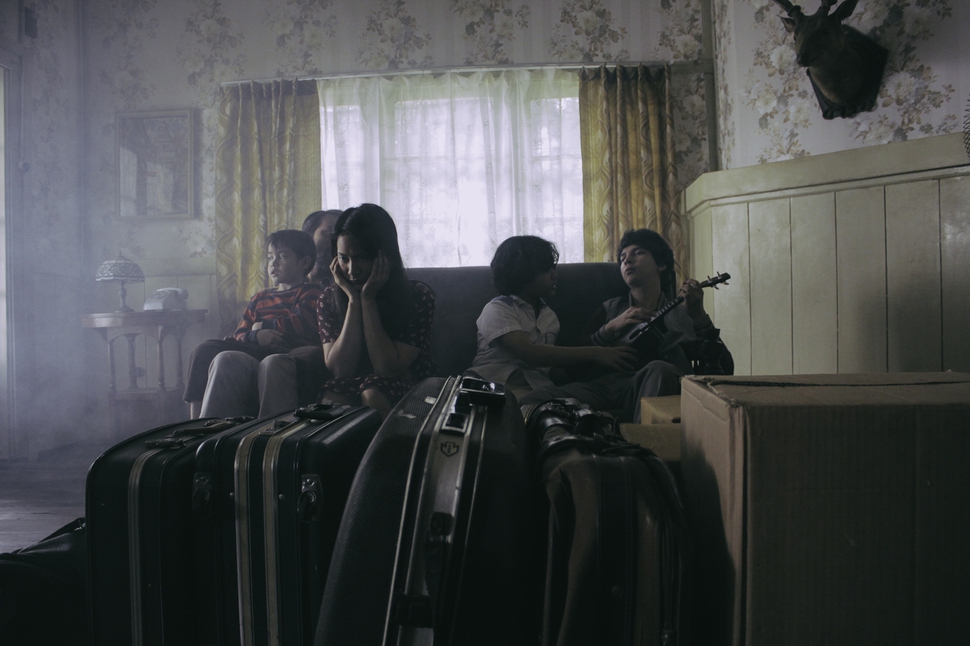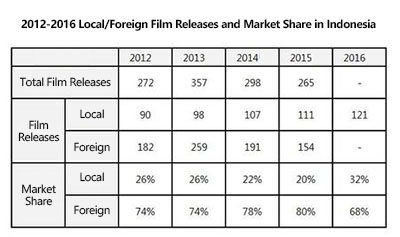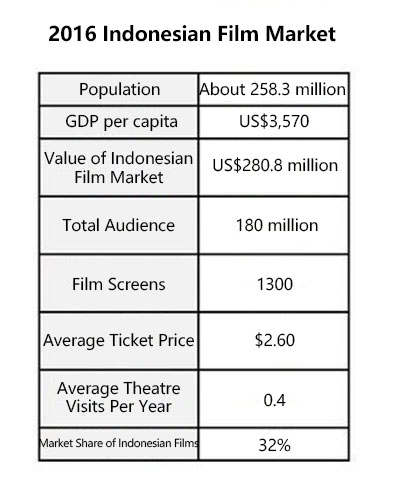 |
|
A scene from the film, “Satan’s Slaves,” a collaboration between CJ E&M and Indonesia (provided by CJ E&M)
|
CJ Entertainment has been at the vanguard, jointly producing a number of films with Indonesian companies
Exhibit A: 4.1 million people – the best showing at the Indonesian box office this year, and the fourth best performance by a local film ever. That’s the remarkable success enjoyed by “Satan’s Slaves,” a horror film jointly produced by CJ Entertainment and Rapi Films, an Indonesian film studio. The film stayed atop the Indonesian box office for three weeks after its release in September, overwhelming the local competition, as well as leading foreign films like Kingsman: The Golden Circle. It was nominated for 13 categories at an Indonesian film festival and swept seven of them, including best cinematography and best art direction.
Exhibit B: Jan. 11, 2018. “The day will be a meaningful one in the overseas expansion industry,” said Yu Jeong-hun, president of Showbox, a South Korean film distributor. That’s the release date for “Forever Holiday in Bali,” a film jointly produced by Showbox and an Indonesian partner. “Forever” is a romantic comedy about a K-pop idol who makes the acquaintance of a female Indonesian university student and enlists her help to travel around the island of Bali. With Ody Harahap (who directed the Indonesian version of “Miss Granny”) as director and Thunder, a former member of K-pop group MBLAQ, in the leading role, the film has generated a buzz.
The South Korean film industry is setting its sights on Indonesia for its overseas expansion. South Korea-China relations, which had been strained because of the THAAD deployment, are supposedly starting to thaw, but the industry has learned a definite lesson from the agonizing shutdown of the “culture road” over political issues. That lesson, in short, is that overseas expansion needs a paradigm shift in its total reliance on the Chinese market. While China’s ban on South Korean cultural imports was in full force, a country emerged as a new land of opportunity – and that country is Indonesia.
 |
|
“Satan’s Slaves” (provided by CJ E&M)
|
■ A history of expansion into Indonesia, and the results thus far
 |
|
2016 Indonesian Film Market
|
CJ Entertainment was the quickest to move into the Indonesian market and enjoy success. The company jumped into direct distribution in the country with “A Werewolf Boy” in 2013, and in the five years since then it has introduced a total of 35 South Korean films to the country, including “Flu,” “Snowpiercer,” “The Admiral: Roaring Currents” and “Ode to My Father.” “The Battleship Island,” which debuted this past summer, has sold 200,000 tickets so far, making it the most successful South Korean film released in Indonesia.
After warming up to the Indonesian market through direct distribution, CJ Entertainment has adopted a localization strategy based on producing films through joint ventures with Indonesian companies. “We’ve released a string of films over the past two years, starting with ‘A Copy of My Mind,’ our first joint production, in Feb. 2016 and continuing with the medical romance ‘Catatan Dodol Calon Dokter’ in Oct. 2016 and ‘Sweet 20’ (the adaptation of ‘Miss Granny’ mentioned above] and ‘Satan’s Slaves’ this year. ‘Sweet 20’ brought in more than a million theatergoers, ranking seventh on the list of the most successful films released in Indonesia this year,” explained Lim Myeong-gyun, who leads overseas operations for CJ Entertainment’s film division.
The movie theater industry is also swiftly moving into Indonesia. CJ CGV opened for business in Indonesia in Jan. 2013 by taking over the management of a local chain called BlitzMegaplex, and this January, it renamed the brand “CGV.” In nine months, the chain has topped 10 million in ticket sales. CGV has moved aggressively in the market; at the time of acquisition, it had just nine theaters and 76 screens, but over the past five years it has expanded its presence to 35 theaters and 233 screens while solidifying its position as the second largest theater chain in the country. It has even managed to bring the market share of local theater operator Cinema 21, which has maintained a stranglehold on the industry since the 1980s, down to 70%.
“Our goal is to be operating at least 100 theaters by 2020,” said Kim Gyeong-tae, the president of CGV Indonesia.
This year, Lotte Cinema also announced that it would be expanding into the movie theater business in Indonesia. “We’re planning to open 15 additional theaters in Southeast Asia next year, with a focus on Indonesia,” said a spokesperson for Lotte Entertainment.
 |
|
The Indonesian version of the Korean film “Miss Granny” is called, “Sweet 20” (provided by CJ E&M)
|
■ Why Indonesia, of all places?
 |
|
2012-2016 Local/Foreign Film Releases and Market Share in Indonesia
|
The reason the film industry has its eyes on Indonesia is because of the huge size of the market and the potential for growth. Indonesia has a population of 260 million, which is five times that of South Korea and the fourth largest in the world. Last year, the country’s film industry was worth US$280 million, with over 100 million people visiting the cinema each year. Those figures are immense, ranking 1st in the Southeast Asia film industry and 15th worldwide.
As of last year, Indonesians went to the movies an average of just 0.4 times a year. There is also a tremendous shortage of theaters, with just 1,461 screens across the entire country (as of Aug. 2017). Based on population, experts believe that the number of theaters in Indonesia will rise to as many as 15,000 in the future. The number of screens in Indonesia has already more than doubled over the past five years. In short, there is room for a lot of growth.
The growth of local cinema is gradually speeding up, which is another factor working in the favor of South Korean companies that are pursuing localization through joint ventures. Last year, local films enjoyed a 32% share of the box office, up quite a bit from the 20% range where it remained for several years before that. The number of films being released each year also topped 100 for the first time in 2014 before rising to 111 in 2015 and 121 in 2016. Until 2015, only two or three local films brought in an audience of more than 1 million in a year, but 10 of them did so last year.
Another reason that the South Korean film industry has accelerated its move into Indonesia was the complete liberalization of the Indonesian film industry in May 2016. “By removing the film industry from the Negative List for investment through a presidential regulation, Indonesia opened the market and enabled up to 100% foreign investment. This has radically changed the investment environment,” Lim said.
“Forever” by Showbox was also promoted through a forum on joint ventures with the Indonesian film industry that was organized by the Korean Film Council after the Indonesian market was liberalized.
Another major boon to the South Korean movie industry in Indonesia is the Korean Wave, also known as Hallyu, which has a strong presence in the country. “The fact is that the Hallyu craze, including the popularity of K-pop and Korean drama, makes it easier to promote and market film collaborations. Giving the lead role in ‘Forever’ to Thunder, a former member of an idol group, was a strategy motivated by Hallyu,” said a spokesperson for Showbox.
By Yoo Sun-hee, staff reporter
Please direct questions or comments to [english@hani.co.kr]













